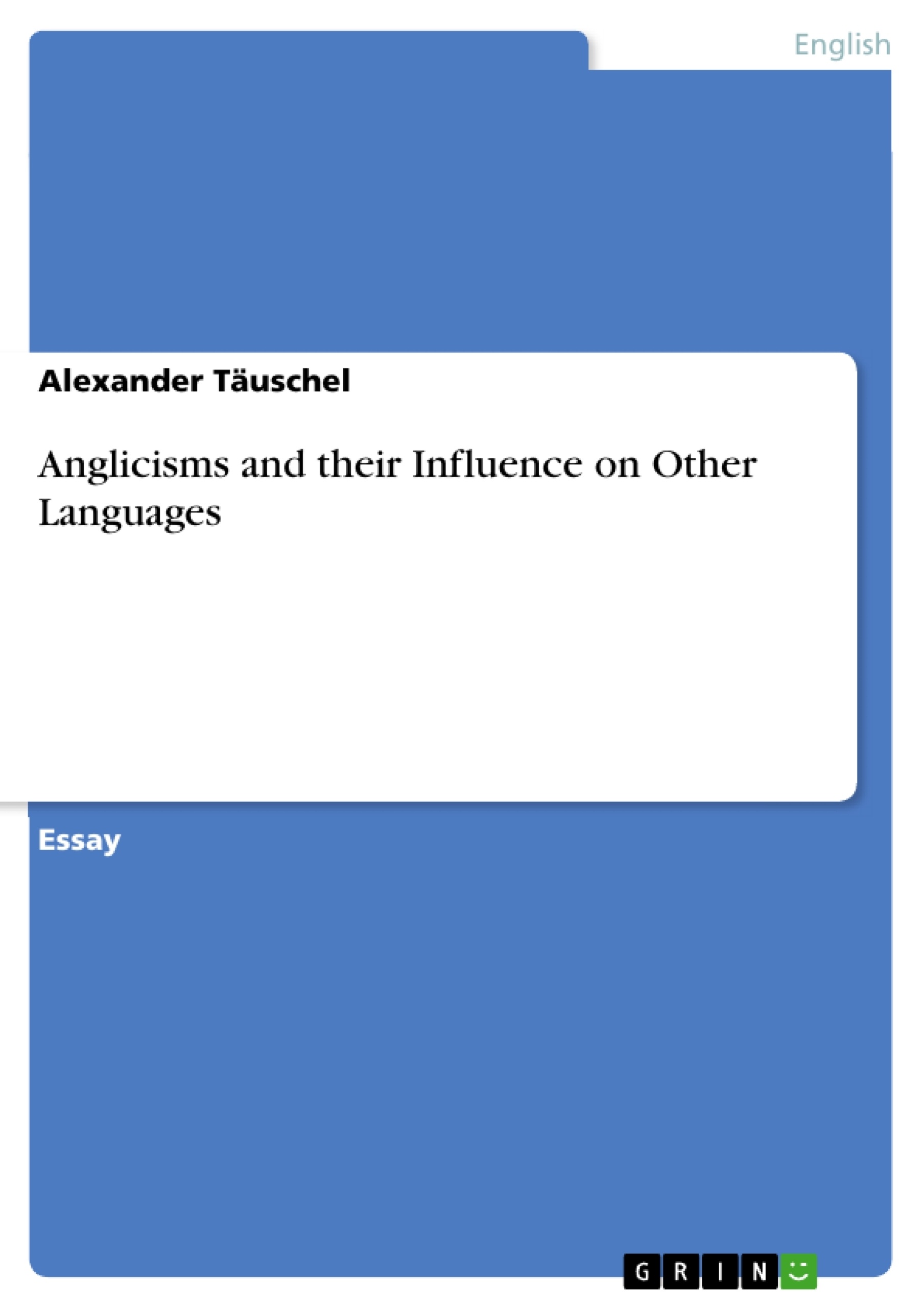This essay was written as an elaboration for my final oral exam in winter term 2008/2009. It is supposed to give information about the importance of the lish language as a global language and the process of direct loaning as a result, the process of indirect loaning, pseudo and hybrid anglicisms, and aspects of direct and indirect loan coinage. It will also investigate on the prestige status of English and the loaning of sayings, phrases and idioms, and the role of the trend of internationalisation of languages like German or France. It will conclude with an attempt to approach the question whether English will make other es obsolete in the future.
Table of Contents
- (1) The Importance of the English Language
- (2) What are Anglicisms? / Direct Loaning
- (3) The Process of Indirect (or Secondary) Loaning
- (4) Pseudo Anglicisms
- (5) Hybrid Anglicisms
- (6) Direct and Indirect Loan Coinage
- (7) The Prestige Status of English and the loaning of Sayings, Phrases, and Idioms
- (8) Trend: Internationalisation of Languages
Objectives and Key Themes
This essay explores the significant influence of the English language on other languages, focusing on the processes of anglicism adoption and their implications. The essay examines various types of anglicisms, including direct and indirect loans, pseudo-anglicisms, and hybrid forms. It also investigates the role of English prestige and the impact of globalization on language.
- The global dominance of English and its historical context.
- Different types of anglicisms and their formation processes.
- The prestige of English and its influence on borrowing practices.
- The internationalization of languages and the role of English.
- The impact of anglicisms on the evolution of other languages.
Chapter Summaries
(1) This chapter establishes English as a global language, discussing its widespread use and the factors contributing to its dominance, including historical and political influences.
(2) This section defines anglicisms and explains the process of direct loaning, where words are borrowed directly from English into other languages, illustrating how pronunciation and spelling adapt to the recipient language.
(3) This chapter contrasts direct loaning with indirect loaning, where words are borrowed through an intermediary language, providing examples to illustrate this process.
(4) This section examines pseudo-anglicisms, words created within a language to resemble English words but lacking actual English counterparts, highlighting the prestige associated with English even in the creation of non-existent words.
(5) This chapter explores hybrid anglicisms, which combine English borrowings with elements of the recipient language, providing examples from German.
(6) This section discusses direct and indirect loan coinage, differentiating between obvious borrowings and those whose origins are less clear, illustrating how loan words adapt to the grammatical structures of recipient languages.
(7) This chapter analyzes the prestige of English and its impact on the borrowing of sayings, phrases, and idioms, providing examples of direct translations from English into German.
(8) This section examines the general trend of language internationalization, mentioning examples of internationally understood words and the role of English as a lingua franca in various fields, while noting France's attempts to resist English borrowings.
Keywords
Anglicisms, English language, loanwords, direct borrowing, indirect borrowing, pseudo-anglicisms, hybrid anglicisms, loan translation, language contact, globalization, language prestige, internationalization.
Frequently Asked Questions
What are anglicisms?
Anglicisms are words or idioms borrowed from the English language into another language, such as German or French.
What is the difference between direct and indirect loaning?
Direct loaning happens when a word is taken straight from English. Indirect loaning involves an intermediary language that passes the term along.
What is a pseudo-anglicism?
These are words that look or sound English but do not exist in the English language with that meaning, often created to gain prestige (e.g., "Handy" in German).
What are hybrid anglicisms?
Hybrid anglicisms combine an English word with a word from the recipient language to form a new compound term.
Why does English have such a high prestige status?
Its status as a global lingua franca in business, science, and entertainment makes borrowing English terms attractive for many speakers worldwide.
Will English make other languages obsolete?
The essay explores this question, considering the trend of internationalization and the resistance of some languages, like French, to English influence.
- Quote paper
- M.A. Alexander Täuschel (Author), 2008, Anglicisms and their Influence on Other Languages, Munich, GRIN Verlag, https://www.grin.com/document/119299



